- Home
- Cecelia Ahern
One Hundred Names Page 11
One Hundred Names Read online
Page 11
A final lock was slid and the door opened until a chain stopped it from going any further. A pair of eyes stared back at her, bloodshot, rheumy eyes that looked as if they hadn’t seen the light of day for years. Kitty couldn’t help but take a step back.
‘Archie Hamilton?’ she asked, and the eyes looked her up and down, then the door slammed in her face.
She looked around, unsure whether to knock again or leave. The boy sitting on the basketball sniggered.
‘Do you know Archie?’ she asked.
‘Do you know Archie?’ he responded in exactly the same voice, mimicking her perfectly, getting the high-pitched tone and the slight country accent. In fact she felt he exaggerated the accent a little too much but either way it had a disturbing effect, which she was sure was intended. She debated leaving but she suddenly heard a voice inside calling Archie’s name and she stayed where she was. More locks turned, quicker this time, the chain slid across the door and the door was suddenly pulled open wide. A man, not the man who had first answered, but who replaced intimidation with anger and exhaustion, stared at her. He examined her as he put on his denim jacket, then, as though not liking what he saw, he stepped outside and she jumped back. He slammed the door and locked it. Then he put the keys in his pocket and charged off towards the stairs.
‘Excuse me?’ Kitty called out politely.
‘Excuse me?’ she heard her voice echoed behind her from the boy on the basketball.
The man kept on walking; she ran after him. He skipped down the concrete stairs. She gave up on politeness.
‘Are you Archie?’
‘What if I am?’
‘Well, if you are, I’d love to talk to you,’ she said, breathless as they started on the third flight of stairs.
‘About what?’
‘About … well, if you stop racing, I can tell you what.’
‘I’m late for work.’ He upped his speed just as she had managed to catch up with him.
‘Maybe we can make an appointment to meet at a time that suits you better. Here’s my card …’ She rooted in her handbag, which slowed her down, and he was then a level ahead of her. She retrieved the card and jumped down the steps in twos and threes to catch up.
He didn’t take the card. ‘I don’t talk to journalists,’ he said, hitting the ground floor and walking away from the flats.
Kitty eyed the crowd of kids around her bike and chose to jog alongside Archie.
‘How did you know I was a journalist?’
He looked her up and down as if to answer her question. ‘You have that desperate look.’
She was only mildly insulted as, judging by their cat-and-mouse routine, he was correct.
‘You left a message on my phone.’
‘Yes.’
‘Don’t call me again.’
They rounded the corner and she expected him to keep walking but suddenly he stopped, took a sharp left and disappeared into a chipper. Kitty had to backtrack a few steps. She watched him through the window: he lifted the counter barrier, took off his jacket and disappeared in the back. There was a queue of two people inside the shop. Kitty glanced at the sign above the window: ‘Nico’s’. Archie Hamilton reappeared wearing a white hat and apron. His colleague filled him in on the orders and left him alone. She pushed open the door.
‘You could be done for stalking,’ he said, barely looking at her. A stalking offence to add to her woes was all she needed right then.
The two in the queue stared at her.
‘I’ll have a single of chips,’ she ordered.
He stopped shovelling chips then and looked at her. She couldn’t tell if he was impressed or if he wanted to throw boiling hot chip fat at her. There was a fine line. He made a decision and lowered the basket of frozen chips into the bubbling oil. Kitty debated waiting for the one customer ahead of her to leave, then thought against it. She didn’t need super investigative powers of journalism to know that this was her one chance with Archie.
‘I’m going to leave my card here,’ she said, placing it on the counter.
He glanced at it, then back at his work. He made a burger, chips, bagged it, took money at the till and the customer left.
‘I’ve never talked about it. Not then and I won’t now. Nothing’s changed.’
Kitty was most definitely missing a trick. ‘I’m not sure who exactly you think I am but—’
‘You’re a journalist, aren’t you?’
‘Yes.’
‘You’re all the same.’
‘I won’t talk to you about anything you don’t want to talk about.’
‘I’ve heard that before too.’
He shovelled her chips into a small white paper bag, then he put the bag into a larger brown bag and shovelled extra in.
‘Look, I’ll be honest with you, I have no idea what you’re talking about or what it is that you don’t want to talk about. I have no idea who you are. I found you on a list of one hundred names as someone I had to interview for a story. I don’t know you or any of the other ninety-nine people and I don’t know what the story is. All I ask for is at least thirty minutes of your time, any time – morning, noon or night – so that we can talk. It may not be about the thing you think it is, or maybe it is, and if you don’t want me to write about it I just won’t write about it, but I can promise you that I’m an honest writer and I’ll keep my word.’
For Constance, for her own sanity, more than anything Kitty wanted to do things right.
He seemed amused, or at least he was now something other than what he had been, which was threatening and intimidating. She guessed he was in his late fifties, maybe sixties, though he could have been younger and the stress was ageing him. He clearly was stressed; he carried it in bags around his body. His hair was completely grey, his skin was red, dry and unhealthy, he appeared overweight but his arms were muscular beneath his T-shirt. He was to Kitty the epitome of stressful living, unhealthy eating and not enough sleep. She wondered how far off she was from looking like that. She couldn’t read him at all. Finally he looked at her and she felt a swell of relief that her words had made some kind of difference.
‘Salt and vinegar?’ he asked, and she sighed.
‘Yes, please.’
He saturated the chips with vinegar, folded the top over and placed the sopping bag directly down on her business card.
‘Two seventy.’
She paid and couldn’t think of anything further to say. She took the chips and left the vinegar-covered card on the counter. At least she had dinner. When she rounded the corner her bike was gone, and so were the kids.
Kitty stood at the base of the steps that led to her flat and looked up into the darkness, dreading to think what might be waiting for her that evening.
‘Kitty? Kitty Logan, is that you?’
She whirled around, trying to find the source of the voice. A man inside the dry-cleaners was squinting at her, head cocked to one side and then to the other as he tried to figure her out. She took him in: the smart suit, the respectable haircut, the polished shoes, the long face, the strong jaw. The small circular glasses were a new addition, though.
‘Richie?’ she asked. ‘Richie Daly?’
He looked relieved and she knew she was right. She went into the dry-cleaners to meet him, usually a no-no for her as the owner was only ever a moment away from throwing her on the ironing board and steaming her to death.
‘I knew that was you!’ he laughed, holding his arms open for Kitty to fall into. She hugged him warmly and then stepped back to study him.
‘My God, you look like you but you’re completely different,’ she said, unable to believe her eyes.
‘For the better, I hope,’ he said with a grin. ‘The ripped cords and Converse weren’t a good look.’
‘And your hair! It’s all gone!’
‘I could say the same about you,’ he replied, and her hand immediately went to her bobbed hair, which had always been halfway down her back in college.
‘Listen to us – you’d swear we hadn’t met in fifty years,’ she laughed.
‘Well, twelve years is a long time.’
‘Is it twelve? Scary. So what are you doing here?’
He signalled his surroundings, ‘Uh … dry-cleaning.’
‘Of course.’ She rolled her eyes.
Her landlord cleared his throat, interrupting their conversation, and looked at them like he wanted to kill them both.
‘I live just upstairs, would you like to … I mean, do you want a coffee or something?’ Half-way through her sentence she realised there could be a possible wife and two point four kids waiting in a car outside the dry-cleaners, wondering why Daddy was hugging a strange woman. She looked outside self-consciously.
‘A coffee?’ Richie asked, appalled. ‘Forget it, let’s get a proper drink.’
They went to Smyths pub on Fairview Strand, it was seven o’clock and busy on a Friday. They managed to find a table with two stools, and they shared the chips and caught up on old times.
‘So what are you doing?’ Kitty asked after filling him in on her work history since college, leaving out the disastrous Colin Maguire débâcle, of course, and though she was guessing he already knew, as she felt the entire world knew, he was polite enough not to bring it up.
‘Me?’ He looked down at his pint. It was his fourth already and Kitty, after her fourth glass of wine, was already feeling woozy. ‘I’m currently writing a book.’
‘A book? Wow, Richie, that’s fantastic.’
‘It’s funny to hear you call me Richie, you know. They all call me Richard now.’
‘Well, of course, any decent self-respecting author wouldn’t settle for anything less. What’s the book about?’
‘It’s a novel.’
‘That’s exciting.’
‘And that’s it,’ he said coyly.
‘Ah, come on, you have to tell me more. Is it romance? Historical? Mills & Boon?’
He laughed. ‘Mills & Boon, definitely Mills & Boon.’
She was suddenly aware of their closeness, how they’d gone from innocent catching-up to flirting, and more importantly, of how much more handsome he seemed now.
‘It’s a crime novel,’ he explained, their heads closer now, their knees touching. ‘I’m about a quarter of the way through. It’s something I’ve always wanted to do but never did. With work and everything it’s hard to find the time to do things for yourself. So I just thought one day, fuck it, Richie, do it. And I did. Or at least I’m trying.’
‘Good for you. It takes a lot for people to follow their dreams. You could be the next Susan Boyle,’ she teased.
‘What about you? Is Thirty Minutes the dream?’
She looked down at her glass and was surprised to see it was empty again; hadn’t she just started it? Richie signalled for another. ‘I don’t know,’ she said, her head spinning nicely and her tongue feeling oversized. ‘I don’t know what the dream is any more.’
‘You don’t like working in TV?’
‘I …’ she hesitated, feeling that at any moment she could explode about all that she felt for the show and its process, but she was guarded. She hadn’t spoken to anybody about it, but Richie genuinely didn’t seem to know. His eyes were soft and welcoming, non-judgemental, and a little bloodshot, and she felt like she was twenty again, back in the college bar, missing lectures at a time when nothing, at least to her now, felt serious. She trusted him. ‘I don’t work for Thirty Minutes any more,’ she finally admitted.
‘No?’ He drained his glass. ‘What happened?’
‘You really don’t know or are you just trying to be nice?’
‘How would I know? Is it something I should know? Kitty, I’m sorry, I’ve had my head in my book for the past few months. I’ve no idea what’s going on. Somebody just told me today that those Chilean miners were all rescued.’
Kitty laughed. ‘That was two years ago.’
‘Well, there you go,’ he smiled. ‘I’m a slow writer. Seriously, you don’t have to tell if you don’t want to. We’re just here for a nice time.’ He smiled supportively.
‘I fucked up a story. I fucked up a story really badly and it ended up going to court, the network lost a load of money, and they suspended me, which is code for never hiring me ever again. Now the magazine that I work for are thinking of doing the same thing because they’re under pressure from advertisers who feel they have a responsibility even though it’s been rumoured they’ve been using child labourers on boats to make their crap products, but in the meantime I’m still working on a story for them even though they can’t publish it and it’s the only thing I truly care about now, but I have a week to my deadline and I still don’t know what the story is and while I’m trying to do that I return to my apartment every evening to find dog shit, paint, toilet roll and whatever vile thing Colin Maguire’s four hundred and fifty thousand euro and his little posse can throw at me.’
When she finished, Richie was looking at her open-mouthed. Kitty did the only thing she could think of to do, the thing she’d needed to do since this all began: she threw her head back and laughed. Hysterically.
When the bar lights were turned on full and last orders were long finished, and a loud man wearing black began to patrol the bar shouting for them to leave, Richie’s hand moved to the small of Kitty’s back, one finger circling above the waist of her trousers, another creeping downward.
‘Let’s go back to your place,’ he said quietly.
‘No. We can’t, it’s booby-trapped,’ she giggled.
‘I like the sound of that …’ He groped her and they laughed.
‘Let’s go back to yours,’ she said, moving in to kiss him.
He was a long way away in Stoneybatter, and as the lights blurred past and she had to lower the window for some air, she did recall wondering why on earth he had been doing his dry-cleaning on the other side of the city.
If she’d had her notebook with her she would have made a note to ask him. Later, she wished she had.
CHAPTER ELEVEN
‘Shit, I’m late.’
‘Late for what?’
‘Birdie.’
‘You’re still pissed.’
They both laughed and Kitty got a whiff of his morning breath and rolled away from him.
‘It’s a story I’m working on.’
‘I thought you weren’t working.’
‘I am, I just don’t know what the story is.’
She sat up and her head pounded so she lay back down again.
‘Are you feeling better today?’
‘What do you mean?’
‘You were crying about a stolen bike.’
Kitty groaned, then she threw the covers off and wandered around his bedroom looking for her underwear. ‘Where the hell are my knickers?’
He pinched his eyes closed, then opened them again suddenly. ‘The kitchen.’ He rubbed his eyes. ‘Shit, my head hurts.’
Kitty found her underwear and the rest of her clothes scattered around his tiny kitchen. She looked out the window. ‘Where are we again?’
‘Stoneybatter,’ he called groggily from the bedroom.
‘You know a guy named Dudley Foster?’
‘No, why?’
‘He’s on my list.’ She pulled her jeans on.
‘What list?’
‘My story.’
He appeared at the door in his underwear, and her vision of him now and the memory of how he looked last night were not one and the same. She felt slightly repulsed. She wondered if she should use his shower but then she was worried he’d want to join her and she just couldn’t go there again. Not now. Possibly not ever.
‘Want me to call you a taxi?’
‘Eh. Yes, please.’
He disappeared into his room to make the call and Kitty brushed her hair with a fork, wiped smudged mascara from under her eyes and stole the deodorant from the bathroom. The second apartment bedroom contained a desk with a computer, and pages scattered everywhere
: the book. She heard the shower going and was about to go snooping into the novel when the intercom rang. It was the taxi driver, waiting downstairs. She went into Richie’s en-suite and knocked awkwardly on the door but he didn’t hear her. She pushed the door open and was faced with his naked self. Again, not something she could stomach that early in the morning with a dreadful hangover.
‘Taxi’s here,’ she said loudly.
He looked up suddenly and soap went into his eyes. She could tell it was stinging as he tried to wipe his lathered face.
‘Uh, I’d better go,’ she said, handing him a towel, but he couldn’t see as he was rubbing his eyes in a frantic effort to get the soap out. It wasn’t the coolest of looks.
‘Okay,’ he said, water dripping from his nose and mouth. ‘Thanks for … last night.’
‘Yeah, you too.’
The most awkward goodbye ever? Definitely in her top five. She stole a banana, let herself out of the apartment, and it was at least thirty minutes more before she stopped cringing.
It was a beautifully bright and hot sunny May Saturday. Anyone with any sense would not be sitting in traffic unless it was for something worthwhile like going to the beach or the park. Seaside villages would be overcrowded with sun-worshippers, their shops lined with queues for ice creams, any restaurant or café with so much as a chair outside would be the most popular place to be for the day. Instead of joining these people on the sand, or on the grass, or al fresco with her frappuccino, Kitty found herself in a smelly taxi wearing yesterday’s clothes, the faint smell of sweat drifting from her armpits when she lifted her arms. She kept her pits firmly clamped down by her side as she tried not to listen to football match commentary at full blast on the M50, her eyes straining to stay open in the sunlight, her head pounding, her mouth cotton wool from the wine, watching with absolute horror as the meter moved at what she questioned was a legal pace. She read the standard sticker on the window that told her that she and every other passenger was entitled to a journey in a clean, hygienic car and not to be pestered by the driver. The driver smelled like he hadn’t washed in a week, the car was filthy and she couldn’t hear herself think over the noise of the radio. Still, at least he wasn’t talking to her and that was something. She made a note of the phone number.

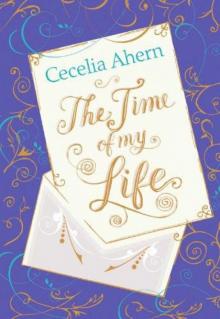 The Time of My Life
The Time of My Life Lyrebird
Lyrebird Girl in the Mirror
Girl in the Mirror Perfect
Perfect One Hundred Names
One Hundred Names PS, I Love You
PS, I Love You Flawed
Flawed The Book of Tomorrow
The Book of Tomorrow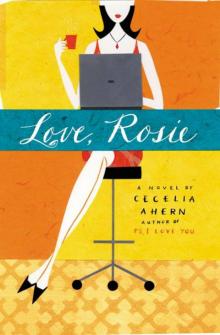 Love, Rosie
Love, Rosie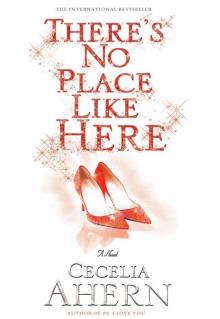 A Place Called Here
A Place Called Here How to Fall in Love
How to Fall in Love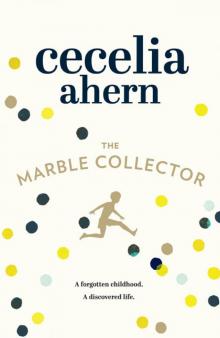 The Marble Collector
The Marble Collector Postscript
Postscript The Gift
The Gift Thanks for the Memories
Thanks for the Memories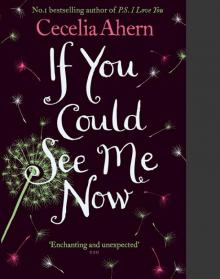 If You Could See Me Now
If You Could See Me Now Roar
Roar Cecelia Ahern 2-book Bundle
Cecelia Ahern 2-book Bundle Girl in the Mirror: Two Stories
Girl in the Mirror: Two Stories PS, I Love You: A Novel
PS, I Love You: A Novel Cecelia Ahern Short Stories
Cecelia Ahern Short Stories There’s No Place Like Here
There’s No Place Like Here